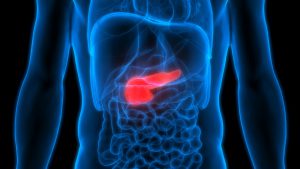When was the last time you were checked for pancreatic cancer? This “silent killer” is difficult to diagnose early on, because it often causes no symptoms until it affects the organs around it. Many cases of it that are caught early on are found simply because testing for unrelated medical conditions shows signs of the disease. Unfortunately, though, most pancreatic cancer patients are diagnosed at stage 4 because of the difficulty of detecting it. It is therefore extremely important to raise awareness about this cancer, and to know the risk factors, the symptoms, and the best ways we currently have to prevent it.
What Is Pancreatic Cancer?
The American Cancer Society estimates that, by the end of 2020, approximately 57,600 people will have been diagnosed with pancreatic cancer and that 47,050 will have died of the disease. Pancreatic cancer occurs when abnormal cells grow and begin to form into tumors in the pancreas. There are two main types: those that form in the exocrine (or digestive enzyme-producing) gland and those that form in the endocrine (or insulin- producing gland). Around 95% of pancreatic cancer cases begin in the exocrine gland.
Patients who are diagnosed in the early stages have better outcomes because they have more treatment options. But in order to be diagnosed early, you have to know the risk factors and the symptoms to watch out for.
Risk Factors

Knowing the risk factors is one of the most important first steps towards detecting pancreatic cancer early. The following factors are known to raise the risk of developing the disease:
- Age– Most people who develop pancreatic cancer are older than 45, and about 90% who develop it are older than 55.
- Gender– Men are diagnosed with pancreatic cancer more often than are women
- Race- African Americans are more likely than any other race to be diagnosed with pancreatic cancer.
- Diabetes– Many different studies show a link between diabetes and an increased risk of developing pancreatic cancer.
- Smoking– People who smoke are two to three times more likely to develop pancreatic cancer than are non-smokers.
- Family History
- Obesity– people who are overweight and those who eat foods high in fat are at an increased risk.
Symptoms
Because the pancreas is deep in the abdomen, doctors usually cannot see or feel a pancreatic tumor during a routine exam. Pancreatic cancer usually doesn’t have any symptoms in the beginning stages; unfortunately, symptoms don’t begin until the cancer has spread. But if you experience any of the following symptoms, you should see your doctor right away to discuss your concerns and get tested:

- Jaundice- yellowing of the skin and whites of the eyes. This happens when the growing tumor presses on the bile duct.
- Unexpected weight loss
- Loss of appetite
- Pain in the upper belly or back
- Nausea and vomiting
- Swollen gallbladder or liver enlargement
- Blood clots
- Dark colored urine
Signs of advanced pancreatic cancer:
- Extreme fatigue
- Worsening stomach or back pain especially after eating or lying down
- Bed sores
- Swelling
- Recently diagnosed diabetes
Prevention
There is no sure way to prevent pancreatic cancer, especially because there are many risk factors that you cannot control, such as your gender or family history. But there are some things that you can do to lower your risk:
- Avoid Smoking

- Eat healthy & watch your weight– Maintaining a healthy weight, as well as incorporating more vegetables and fruit in your diet, might help lower your risk. Processed foods, red meat, and sugary drinks can increase the risk of pancreatic cancer.
- Avoid alcohol– Some studies have linked heavy alcohol use to pancreatic cancer, because excessive drinking can lead to chronic pancreatitis.
- Limit chemical exposure– Exposure to certain chemicals can raise your risk of pancreatic cancer. If you work in a place where you are exposed to chemicals, be careful and make sure you’re following proper safety guidelines to protect yourself.
For now, awareness is the best defense against this “silent killer.” While there is no way to prevent pancreatic cancer, you should know the risks and the ways that you can reduce them, including staying as healthy as possible and getting screened whenever you experience any concerning symptoms.